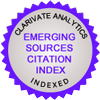Akış madenciliği ve makine öğrenimi ile yoğun bakım hastalarında sepsis tahmini
Melike Akyüz, Yunus Doğan, Atakan Koçyiğit, Ayşe Pınar MiranDokuz Eylül Üniversitesi, Mühendislik Fakültesi, Bilgisayar Mühendisliği Bölümü, Buca /i̇zmir, TürkiyeÇoklu organ yetmezliği olarak bilinen Sepsis hastalığı yoğun bakımlardaki tüm hastalar için, başka her ne hastalıklara sahip olurlarsa olsunlar, birinci mortalite sebebidir. Bu çalışmada yoğun bakım hastalarında sepsisi erken tahmin edebilen ve doktoru uyaran yoğun bakım ünitesi karar destek sistemi geliştirildi. COVID-19 virüsünün varyantı ve yoğun bakım hasta sayısı arttığından bu çalışma sepsis ile durumu kötüleştirmeye yönelik bir önlem olarak geliştirilmiştir. Hekimin hastanın sepsis durumunu daha iyi izlemesine yardımcı olmak için kullanıcı dostu bir arayüz ve sistem tasarlanmıştır. Türk hasta değerlerinin referans aralıklarına göre sepsis tahmini yapan bir karar destek sistemi ihtiyacını karşılamak amacıyla geliştirilmiştir. Sepsisi erken tahmin etmede daha iyi bir sonuç için, belirli bir süre içinde elde edilen ve kullanılan verilerin nasıl analiz edilmesi gerektiği ve daha yüksek performansı tahmin etmek için hangi yöntemlerin kullanılabileceği sonucuna varılmıştır. Çalışmada tahmin için makine öğrenmesi (sınıflandırma ve regresyon), derin öğrenme algoritmaları kullanılmış ve elde edilen sonuçlar karşılaştırılmıştır. Araştırmalar sonucunda, 300 yoğun bakım hastasına ait 122400 saatlik veriden oluşan ve Türk hastalarının referans aralıklarına göre yaklaşık %88 ile %94 arasında başarılı sonuçlar tahmin eden yoğun bakım sepsis karar destek sistemi geliştirilmiştir.
Anahtar Kelimeler: Derin Öğrenme, Karar Destek Sistemleri, Makine Öğrenmesi, Tıbbi Bilişim Sistemleri, Akış MadenciliğiPrediction of sepsis for the intensive care unit patients with stream mining and machine learning
Melike Akyüz, Yunus Doğan, Atakan Koçyiğit, Ayşe Pınar MiranDokuz Eylül University, Faculty Of Engineering, Department Of Computer Engineering, Buca/i̇zmir, TurkeySepsis, which is known as multiple organ failure, is the primary cause of mortality for all patients in intensive care units, regardless of their other illnesses. An intensive care unit decision support system that can predict sepsis in intensive care patients early and warns the doctor has been developed. Since the COVID-19 virus, the variant and number of intensive care patients have increased, so this study has been developed as a precaution to worsen the situation with sepsis. A user-friendly interface and system have been designed to help the physician better monitor the patient's sepsis status. It has been developed in order to meet the need for a decision support system that makes sepsis estimation in accordance with the reference intervals of Turkish patients' values. For a better result of predicting sepsis early, it has been concluded how the data obtained and used in a certain period of time should be analyzed and what methods could be used to estimate higher performance. In the study, machine learning (classification and regression), deep learning algorithms have been used for estimation and the results obtained have been compared. As an impact of research, an intensive care sepsis decision support system, which consists of 122400 hourly data of 300 intensive care patients and estimates with approximately between 88% and 94% successful results in accordance with the reference intervals of Turkish patients, has been developed.
Keywords: Deep Learning, Decision Support Systems, Machine Learning, Medical Information Systems, Stream MiningMakale Dili: İngilizce





